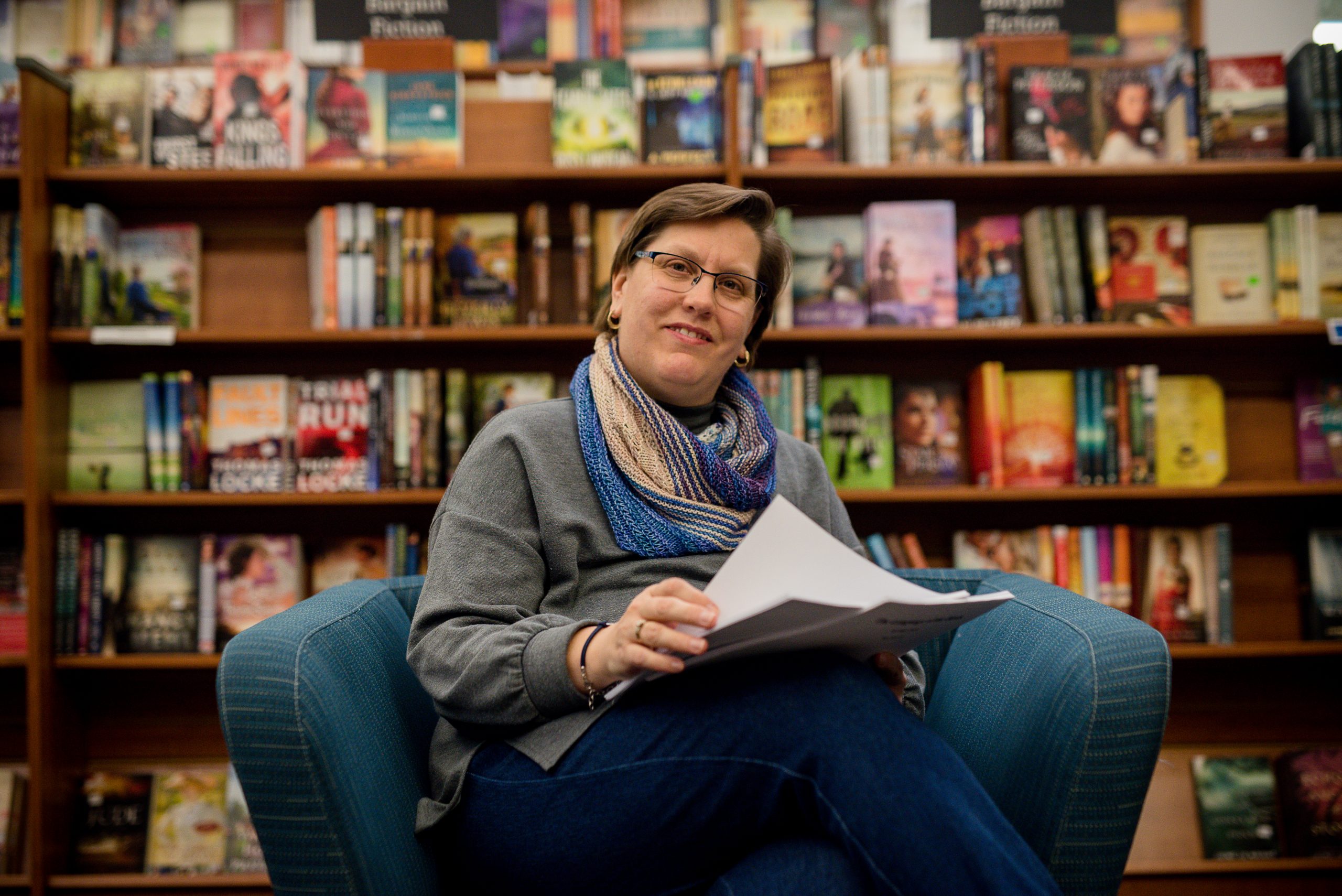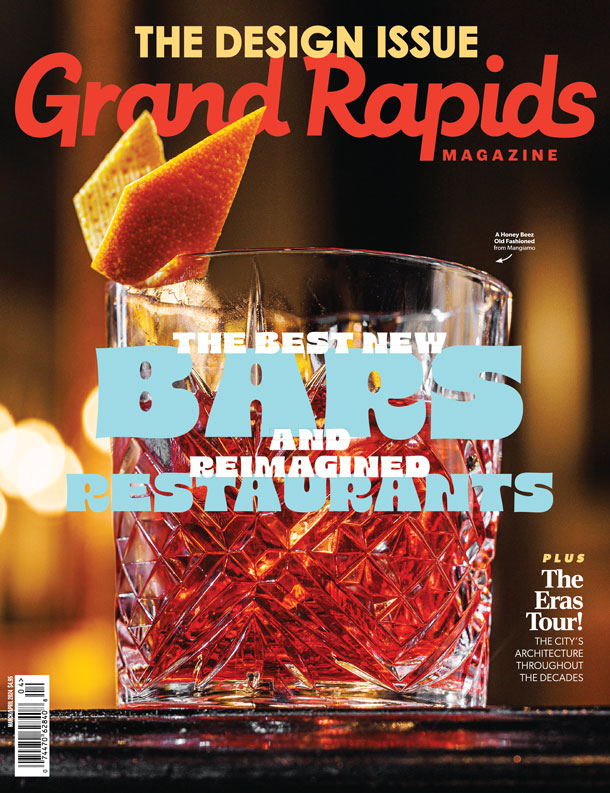Kyd Kane, Grand Rapids’ current poet laureate, said she is a spoken word poet “in limbo,” as so many poets are in these long months of the pandemic that has shut down venues, stopped indoor events and slowed community gatherings.
“People are very interested in having spaces and places to communicate and express themselves again,” said Kane, whose book “Feel: A Collection of S*it” comes out this spring. She is curriculum creator and youth liaison at The Diatribe, a group of teaching artists who facilitate school programming and creative writing workshops rooted in poetry (thediatribe.org).
The poetry community in Grand Rapids is vibrant, active, diverse and deep. She sees it as a long story of past and present. “It’s beautiful to be inspired by expressions that happened in the past. There is a beautiful thread from one generation to the next, an overall passion for expression and to speak to the times,” she said. “I feel that energy. It’s alive in a town where poetry is very important.”
This small sampling is a taste of the many poets at work in Grand Rapids today.
The matriarch: Linda Nemec Foster
Linda Nemec Foster’s original plan was to be a broadcast journalist, so she majored in political science and economics at Aquinas College back in the early 1970s. It was her roommate’s album collection, including Modest Mussorgsky’s “Pictures at an Exhibition,” that changed her trajectory. The Baba Yaga movement did it.
“I was so amazed that a piece of music could sound like a witch flying in the night. I ended up writing my first poem called ‘A Modern Fairytale: The Baba Yaga Poems’ because of that music,” she said. Foster has been writing poetry ever since, with her 12th book, “The Blue Divide,” released in May 2021.
“The Michigan Mermaid: A Tale in Poems,” written with Anne-Marie Oomen, was named a Michigan Notable Book, and “Amber Necklace from Gdansk” was a top three finalist for the Ohio Book Award. Foster was Grand Rapids’ first poet laureate, serving from April 2003 to 2005.
“It all began with being curious and paying attention,” Foster said. “My first poems came when I became curious about something I wasn’t familiar with, which was classical music.”
Curiosity is the impetus for much of her work, she said, including curiosity about her changing pregnant body at age 28, the planets and other cosmological bodies, her family in Poland, the places she and her husband Tony visited, and visual arts, all of which inspired books.
“Get out of your box,” Foster said. “It’s always a joy to see what’s around the corner. Pay attention and be open to that creative spark; be open to everything.”
The patriarch: David Cope
David Cope’s career as a poet began in the 1960s, burgeoning in the ’70s and ’80s with poetry contest wins, a Pushcart Prize in 1977 and an abiding friendship with Beat Generation poet Allen Ginsberg.
“Allen’s ‘Howl’ gave me permission to feel my feelings — my alienation from high school and family, rage at my father for leaving us and anger at all authorities, but it also reminded me that ‘everything that lives is holy.’ He was key to what I wanted to do with my art,” Cope said.
One of the high points in his poetic life was a 1987 reading with Ginsberg and other Objectivist poets Carl Rakosi and George Oppen, as well as Marie Syrkin, wife of acclaimed poet Charles Reznikoff. Another was winning, in 1988, the Award in Literature from The American Academy/Institute of Arts & Letters for his book “On the Bridge.” Cope also twice won first place in the adult category of the local Dyer-Ives annual poetry competition and was Grand Rapids poet laureate from 2011-2014.
Cope, 74, recently stopped publication of “Big Scream,” a poetry magazine he had published beginning in 1974. He gave voice to more than 200 poets in its 60 issues, ranging from Ginsberg to Lawrence Ferlinghetti to Charles Bukowski, as well as many students and poets from Grand Rapids.
These days, he’s putting together a “Best of” from the magazine and finalizing his collected volumes of poetry and prose. “I haven’t had a high-profile career in the publishing community, and the books aren’t likely to be published, but I want to have these writings collected somewhere,” said Cope, who lives with his wife of 54 years, Suzanne, in the house they purchased in 1977. He gardens, works on his collected writings, and recently published “The Correspondence of David Cope and Allen Ginsberg, 1976-1996” (2021). His most recent book of poetry is “The Invisible Keys: New and Selected Poems” (Ghost Pony Press, 2018). The David Cope Papers are curated at the University of Michigan Special Collections Library.
“Poetry allows me to sing words in a deeply satisfying way. It is also a charting of my time on earth and an opportunity to define meaningful experiences,” Cope said. “It saved my emotional and spiritual life more times than I can recall.”
Loudly themselves: Gleason
Gleason finally has settled into being loudly themselves in their role as a spoken word poet. After loving poetry as a young person, they moved away from it in college at GVSU only to find it once again and begin performing at venues such as the Hookah Lounge. Yet they faced another hiatus.
“I was ready to move out of Grand Rapids to a more active poetry scene, but then I went to a show in 2012 and realized it was here,” they said. There was The Drunken Retort at Stella’s Lounge every Monday night and other venues that offered open mics, monthly poetry slams and an active poetry community led by, among others, Marcel Price (Fable the Poet), Jasper Azizi and Kyd Kane.
“This is the kind of poetry folks hadn’t seen before,” Gleason said. “It was off the page, alive, unapologetic, and I could be fully, authentically myself.”
These days they are director of education at The Diatribe, with Gleason active during the pandemic with The 49507 Project in which Black and brown artists painted seven murals in the 49507 neighborhood.
The future looks bright for poetry in Grand Rapids, Gleason said. “I see the passion and hunger in lots of artists to be movers and shakers and reflect the world back to our community. It might look different after the pandemic, but I still see that hunger and sense of community. The goal is continuing to put Grand Rapids on the map for poetry.”
The curious poet: Amy Nemecek
Amy Nemecek, whose poems have been published in numerous journals, including “Windhover,” “Ancient Paths” and “3288 Review,” will have her first book of poetry published this year, thanks to winning first place in the 2021 Paraclete Poetry Prize. Her manuscript, “The Language of the Birds and Other Poems,” will be published by Paraclete Poetry.
Her natural curiosity — which also helps in her role as an editor for Baker Publishing Group — feeds her poems, bits and piece of lines and words recorded in small notebooks tucked into pockets as she walks daily. “I literally write to the rhythm of my feet,” Nemecek said.
Nemecek wrote her first published poem at age 8, turning to writing poetry in earnest during her 12th-grade year when her mom got sick. She died after Nemecek’s freshman year in college, prompting the poet to write “a lot of junk, but I learned how to shape a poem, rein in it.”
Sometimes it’s dreams, or pieces of overheard conversation or paintings that prompt a quick few words in the small notebook. Later, she combs through them, discovering “that’s a poem” or “there’s a poem there.” Longer notebooks are the palette for fleshing out those poems.
Nemecek takes care in feeding her curiosity, encouraging creatives to “read, read, read, including trying stuff outside your comfort zone once in a while.” She visits museums and botanical gardens, travels and walks as a daily practice.
“Listen more than you talk. Stop and listen, stop and watch,” she said. “As poet Mary Oliver said in her poem, ‘When I Am Among the Trees,’ ‘… never hurry through the world but walk slowly, and bow often.’”
Oral history of poetry in the works
Christine Stephens-Krieger, after coordinating the Dyer-Ives poetry competition for 14 years and teaching creative writing at GVSU, is spearheading a new project called An Oral History of Poetry in Grand Rapids.
She plans to coordinate audio and video recordings of 25 poets — as a start — that will be available to the public from its archival home, which is being considered by the Grand Rapids Public Library.
Stephens-Krieger hopes to have filming done by May, with the final products available in the fall of this year. She’ll also collect ephemera such as photos, broadsheets from poetry nights at local venues, posters, programs and more.
“I want to grab all the good things people have done over the years and put it all together to see how good we are. Grand Rapids is special,” Stephens-Krieger said. “I want to gather the past to reach the present.”
She points to poets such as Rodney Torreson, Patricia Clark, David Cope and Linda Nemec Foster, as well as younger artists such as Marcel Price, Gleason, Todd Kaneko and Kyd Kane.
“We’re in a good place to gather information from the past 50 years to have for the future,” Stephens-Krieger said.
For more information, contact Stephens-Krieger at oralhistorypoetrygr@gmail.com.
This story can be found in the March/April 2022 issue of Grand Rapids Magazine. To get more stories like this delivered to your mailbox, subscribe here.











Facebook Comments